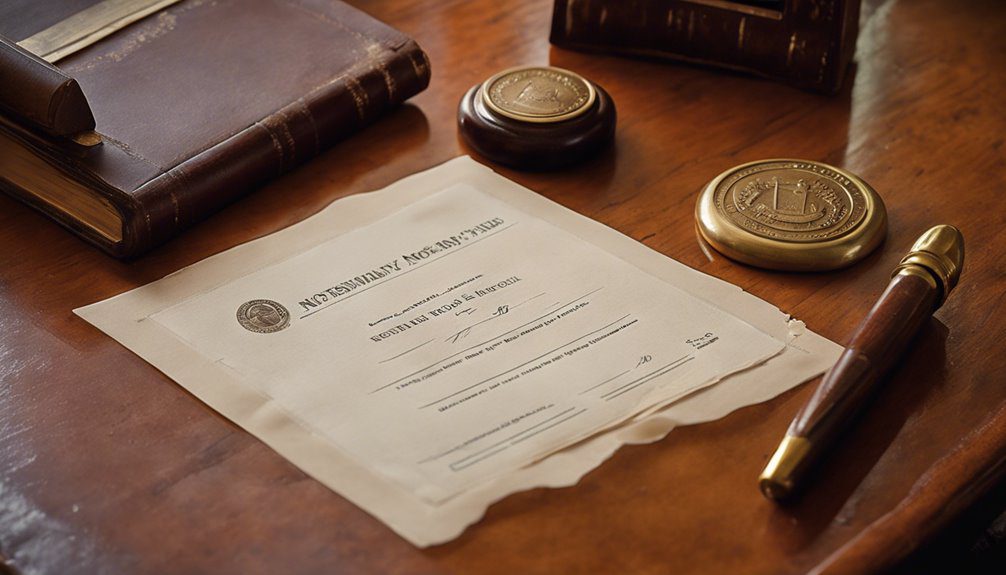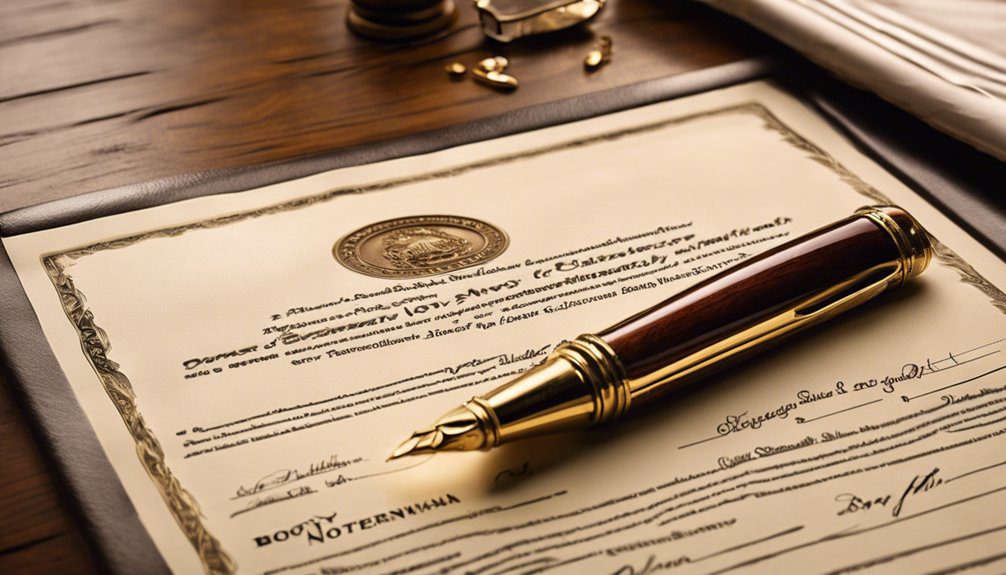If you're considering becoming a notary in Pennsylvania, understanding the notary bond requirement is crucial. This bond not only safeguards the public but also enhances your credibility in the field. You'll find that the bond amount typically ranges from $10,000 to $15,000, which raises questions about its implications for your practice. What responsibilities come with obtaining this bond, and how can it affect your professional reputation? Exploring these aspects will clarify why this requirement matters more than you might think.
What Is a Notary Bond?

A notary bond is, at its core, a type of insurance that protects the public from any mistakes or misconduct a notary might commit while performing their duties.
When you engage a notary, you expect them to act honestly and competently. The notary bond serves as a financial safety net, ensuring that if a notary's actions cause harm or financial loss to someone, the bond can cover those damages.
In Pennsylvania, notaries are required to obtain a bond to fulfill their responsibilities effectively. This bond typically ranges from $10,000 to $15,000, depending on state regulations.
It's crucial to understand that the bond doesn't protect the notary; instead, it safeguards the public. If you ever find yourself in a situation where a notary's error leads to issues, you may file a claim against the bond for compensation.
Having a notary bond in place not only helps maintain public trust but also encourages notaries to adhere to the highest ethical standards.
Importance of Notary Bonds
Notary bonds play a crucial role in ensuring trust and accountability in the notary process. When you act as a notary, you're taking on significant responsibilities, and a bond serves as a safety net for the public. It protects individuals who rely on your services, ensuring that you adhere to the law and perform your duties with integrity.
Having a notary bond not only builds confidence in your work but also enhances your professional reputation. Clients are more likely to choose a notary who carries a bond, knowing they're backed by a financial guarantee in case of any misconduct or negligence. This assurance fosters a sense of security and encourages clients to trust your services.
Additionally, notary bonds can help you stand out in a competitive market. By demonstrating your commitment to ethical practices, you'll attract more clients who value reliability and professionalism. Furthermore, a notary bond serves as a financial guarantee for compliance with laws that protects consumers from potential misconduct.
Ultimately, a notary bond is more than a requirement; it's a testament to your dedication to serving the community responsibly. By investing in a bond, you're investing in your future as a trusted notary.
Requirements for Pennsylvania Notaries

To become a notary in Pennsylvania, you must meet several specific requirements. First, you need to be at least 18 years old and a legal resident of the state. If you're not a resident, you must have a place of employment or practice in Pennsylvania. You should also have a good moral character, which means you mustn't have any felony convictions or certain misdemeanors.
Next, you'll need to complete a notary training course approved by the Department of State. This course will provide you with essential knowledge about notarial acts and the legal responsibilities that come with the role.
After finishing the course, you must pass a written examination to demonstrate your understanding.
Once you've successfully completed the training and exam, you'll need to submit an application for a notary commission to the Department of State. Along with your application, you'll provide proof of your training, a criminal background check, and any other required documents.
How to Obtain a Notary Bond
Obtaining a notary bond is a crucial step in your journey to becoming a notary in Pennsylvania.
To start, you'll need to select a reputable bonding company or insurance provider that offers notary bonds. Many companies specialize in these bonds, so take some time to research your options.
Once you've chosen a provider, you'll typically need to fill out an application. This process may require you to provide personal information, such as your name, address, and contact details. Some companies might also ask for your Social Security number and details about your notary application.
After submitting your application, the bonding company will review your information. If everything checks out, you'll receive your notary bond, which is usually issued in the amount of $10,000. This bond serves as a guarantee that you will comply with the legal obligations required of a notary public in your state.
It's essential to keep this bond safe, as you may need to present it when applying for your notary commission.
Costs Associated With Notary Bonds

Understanding the costs associated with notary bonds is vital for your budgeting process. When you decide to become a notary in Pennsylvania, you'll need to factor in several expenses. The most significant cost is the bond itself, which typically ranges from $50 to $100, depending on the provider and the coverage amount.
In addition to the bond, you'll also need to consider the premium you pay annually. This premium can vary based on your credit history and the bonding company's policies. Some companies may offer lower premiums initially, but make sure to read the fine print for any hidden fees.
Furthermore, there are additional costs, like the application fee for becoming a notary, which can range from $25 to $50. You'll want to set aside funds for supplies, such as stamps and notary journals, which can add another $50 to $100 to your total expenses.
Lastly, if you choose to take a training course or purchase additional resources, be prepared for those costs as well. By understanding these expenses upfront, you can ensure you're financially prepared to start your notary journey.
Responsibilities of a Notary
As a notary in Pennsylvania, you'll have several important responsibilities that ensure the integrity of your role. First and foremost, you must verify the identity of the individuals signing documents. This involves checking valid identification and ensuring that the persons involved are willing and able to sign.
Next, you'll need to administer oaths and affirmations when required, confirming that signers understand the documents they're endorsing. It's crucial to maintain impartiality; you can't have a personal stake in the transaction.
You're also responsible for recording notarial acts in your journal. This record should include details like the date, type of document, and names of the signers. Keeping accurate records not only protects you but also provides a reliable reference if questions arise in the future.
Additionally, you must be familiar with the laws governing notarial acts in Pennsylvania. Staying updated on any legal changes is essential to perform your duties correctly.
Renewing Your Notary Bond

Renewing your notary bond in Pennsylvania is a crucial step to maintain your credentials and legal standing. As your bond approaches its expiration date, you'll want to start the renewal process early to avoid any gaps in your notary status.
Typically, your bond lasts for four years, so keep track of when you need to renew.
To renew your bond, you'll first need to contact your bond provider. They'll guide you through the necessary steps, which usually include filling out a renewal application and paying the renewal fee.
Make sure you review any changes in your personal or business information, as these might affect your bond.
After you've completed the renewal process, your notary bond will be issued.
Don't forget to file the new bond with the Department of State and obtain a new notary certificate. This keeps your records up to date and ensures you're compliant with Pennsylvania law.
Conclusion
In conclusion, securing a Pennsylvania notary bond is essential for protecting both you and the public you serve. It not only demonstrates your commitment to ethical practices but also enhances your professional reputation. By understanding the requirements and responsibilities, you can navigate the process smoothly. Remember, renewing your bond is just as important to maintain your notary status. So, take the necessary steps to ensure you're covered and continue providing reliable notarial services with confidence!


